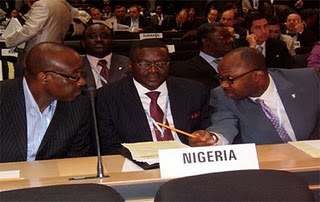As described in a previous post – the 63rd World Health Assembly has just concluded in Geneva. Despite the 7 journalists that were part of the Nigerian delegation, very little has been reported in the Nigerian press. We therefore summarise the three most important issues discussed.
Three issues that caused the most furore at the Assembly was the issue of health worker migration, counterfeit drugs and the methods of electing a new Director General for the WHO.
Starting with the later …
The WHA has been discussing rotation (no not only our PDP has this dilemma!). It has been discussing the possibility of rotating the post of Director-General among WHO’s regions since 2007.
Two schools of thought exist – one says that personal and professional qualities required to perform fully and effectively the functions of chief technical and administrative officer of the organization should be the overriding consideration, and another says no… a regional rotation of the post is the way to go!.
The Regional Committee for Africa strongly supported the principle of rotation of the post of Director-General among the regions. The full report can be found here. Vanguard’s Sola Ogundipe who was part of Nigeria’s official delegation to the WHA reported this as Nigeria, Others, to Vie for WHO’s DG Seat. Well, I must confess this is one area, with 11 years of PDP in power that we have a lot of experience in, and the African delegation may well tap into this. Indeed we might offer to redeploy the entire Board of Trustees of PDP to fight this noble battle.
The other major issue that animated the Assembly was the draft global code of practice for the international recruitment of health personnel.
The debate on international health worker recruitment and its impact on health systems has been intense in recent years. The WHA had previously noted with concern that “highly trained and skilled health personnel from the developing countries continue to emigrate at an increasing rate to certain countries”, thereby weakening health systems in their countries of origin, and requested the Director-General to develop a code of practice on the international recruitment of health personnel in consultation with Member States and all relevant partners. In response, the Secretariat initiated a global consultation process in order to produce a draft code as a priority activity and as part of its agenda to strengthen health systems based on primary health care. This draft code was considered and most of the debate at the Assembly was mostly around the inclusion of the term
“…ethical”
Most of our friends in “receiver” countries resisted the use of this term as this will presumably put them in a rather difficult situation if they were seen not to be abiding by the requirements of the code.
Also, while most “receiver” countries seem to have come to terms with the apparent “no brainer” that they will have to make some serious contributions to “donor” countries, they absolutely resisted any attempts to suggest that they should pay some reparations for historical unethical recruitment. The full paper considered by the WHA can be accessed here.
Photo credit – Vanguard Press
Never doubt that a small group of thoughtful committed people can change the world; indeed it is the only thing that ever has…Margaret Mead



